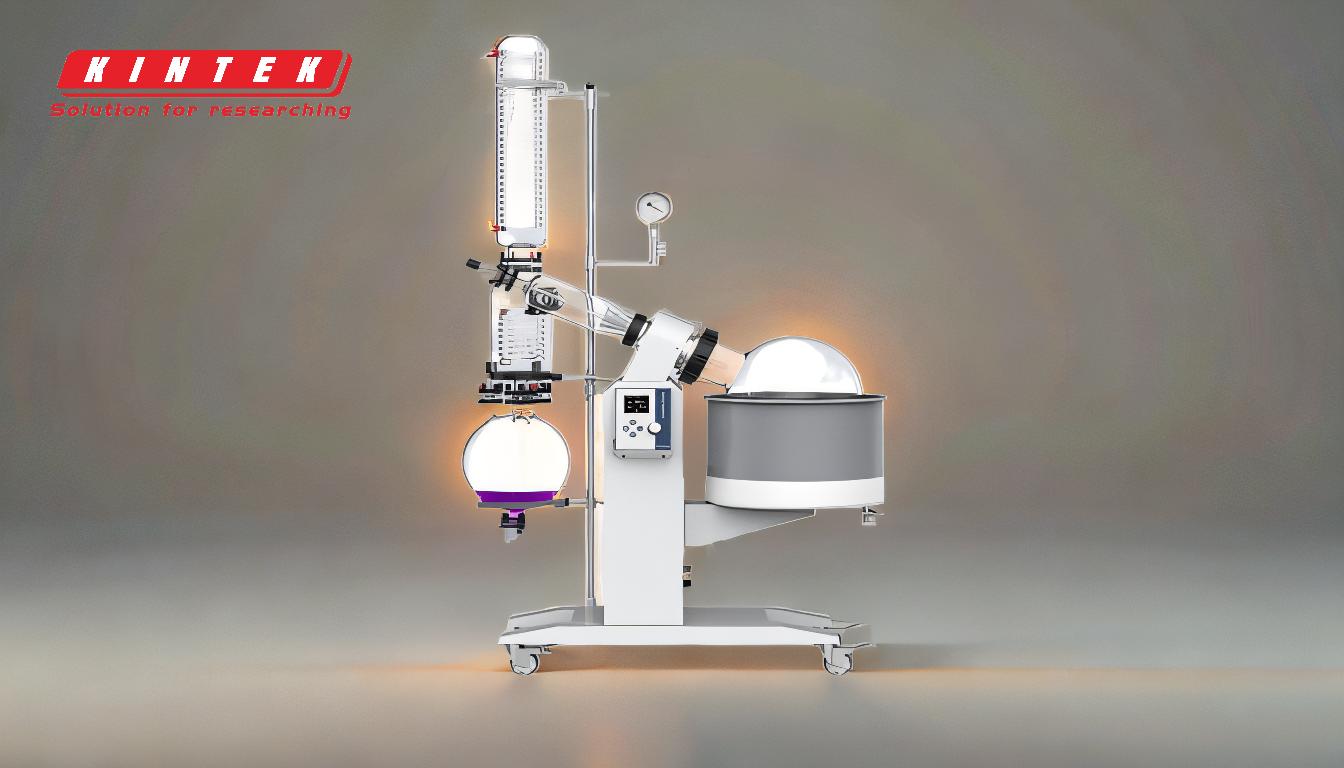A rotary evaporator, commonly referred to as a rotovap, is a versatile and essential piece of equipment in chemistry and pharmaceutical laboratories. Its primary purpose is to facilitate the efficient and gentle removal of solvents from samples through evaporation and condensation. This process is crucial for tasks such as distillation, concentration, drying, and purification of organic compounds. Rotary evaporators are particularly valued for their ability to handle mixed solvents, recover solvents after extraction processes, and prepare samples for further analysis. They are widely used in chemical synthesis, natural compound extraction, and solvent recovery, making them indispensable in both research and industrial settings.
Key Points Explained:

-
Distillation and Solvent Separation:
- Rotary evaporators are primarily used for distillation, a process that separates solvents from mixtures based on their boiling points. The rotovap achieves this by evaporating the solvent under reduced pressure and then condensing it back into a liquid form. This method is particularly effective for organic compounds and mixed solvents, allowing for the recovery of pure solvents or the isolation of specific compounds.
-
Concentration of Solutions:
- Another key application of rotary evaporators is the concentration of solutions. By evaporating unwanted solvents, the rotovap can reduce the volume of a solution, leaving behind a more concentrated sample. This is especially useful in chemical synthesis and sample preparation, where precise concentrations are required for further analysis or reactions.
-
Drying of Samples:
- Rotary evaporators are also employed for drying samples. By removing solvents through evaporation, the rotovap can produce dry, solvent-free samples. This is critical in applications such as freeze-drying preparation, where the removal of solvents is necessary to preserve the integrity of the sample.
-
Chemical Synthesis and Reflux:
- In chemical synthesis, rotary evaporators are used to facilitate reactions under reflux conditions. The rotovap allows for the controlled removal of solvents, which can help drive reactions to completion or isolate desired products. This makes it a valuable tool in organic chemistry labs for synthesizing and purifying compounds.
-
Extraction of Natural Compounds:
- Rotary evaporators play a significant role in the extraction of natural compounds, such as essential oils or active pharmaceutical ingredients. By gently evaporating solvents, the rotovap can isolate these compounds without degrading them, preserving their natural properties and ensuring high-quality extracts.
-
Solvent Recovery:
- One of the practical uses of rotary evaporators is in solvent recovery, particularly after processes like winterization or extraction. For example, ethanol recovery is a common application, but the rotovap can also recover a wide range of other solvents, provided they are compatible with the equipment's gasket materials. This not only reduces waste but also lowers costs by reusing solvents.
-
Gentle and Efficient Evaporation:
- The rotary evaporator is designed to perform evaporation gently and efficiently. By operating under reduced pressure, it lowers the boiling points of solvents, minimizing the risk of thermal degradation. This makes it ideal for heat-sensitive compounds that require careful handling.
-
Versatility in Laboratory Applications:
- The specific use of a rotary evaporator depends on the laboratory's requirements and the nature of the substances being tested. Whether it’s for concentrating solutions, testing vaporized substances, or preparing samples for analysis, the rotovap offers a flexible solution tailored to diverse experimental needs.
In summary, the rotary evaporator is a multifunctional tool that plays a critical role in modern chemistry and pharmaceutical laboratories. Its ability to distill, concentrate, dry, and recover solvents makes it indispensable for a wide range of applications, from chemical synthesis to natural product extraction. By combining efficiency, precision, and versatility, the rotovap meets the needs of researchers and industrial professionals alike.
Summary Table:
| Application | Description |
|---|---|
| Distillation and Solvent Separation | Separates solvents based on boiling points under reduced pressure. |
| Concentration of Solutions | Reduces solvent volume to concentrate samples for analysis or synthesis. |
| Drying of Samples | Removes solvents to produce dry, solvent-free samples for further use. |
| Chemical Synthesis and Reflux | Facilitates reactions by controlled solvent removal for compound purification. |
| Extraction of Natural Compounds | Isolates compounds like essential oils without degradation. |
| Solvent Recovery | Recovers solvents like ethanol for reuse, reducing waste and costs. |
| Gentle and Efficient Evaporation | Minimizes thermal degradation for heat-sensitive compounds. |
| Versatility in Labs | Adapts to diverse experimental needs, from sample prep to solvent recovery. |
Need a rotary evaporator for your lab? Contact us today to find the perfect solution!










